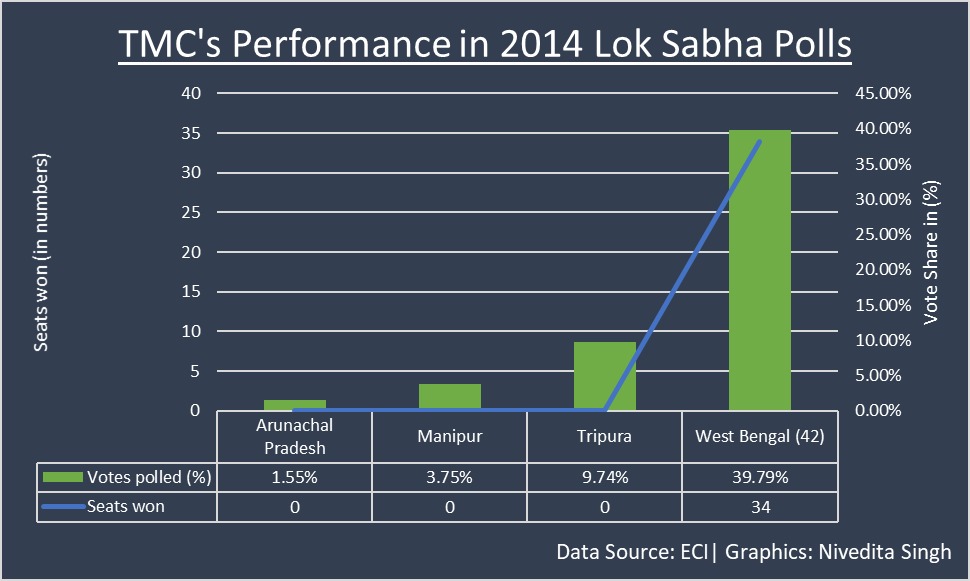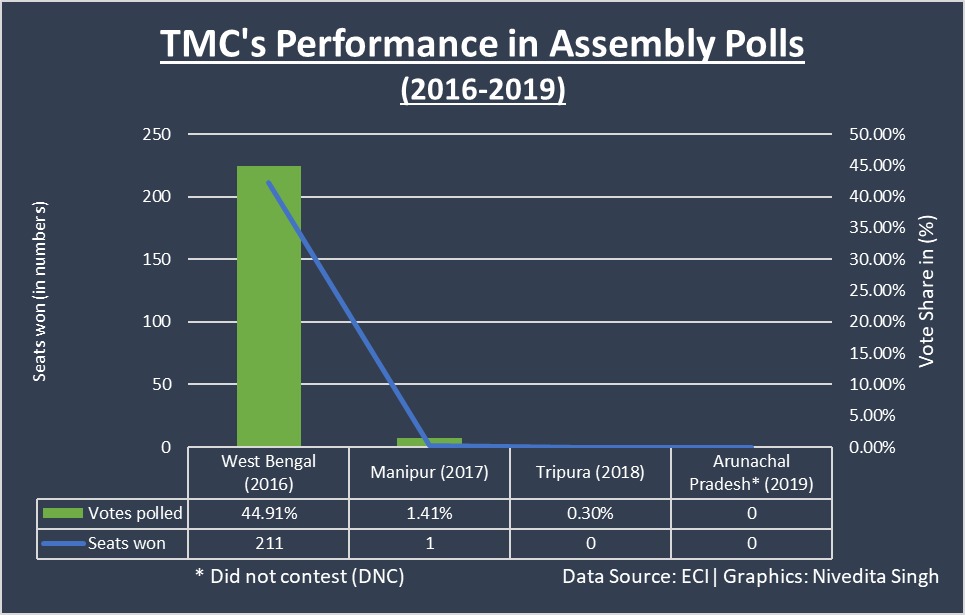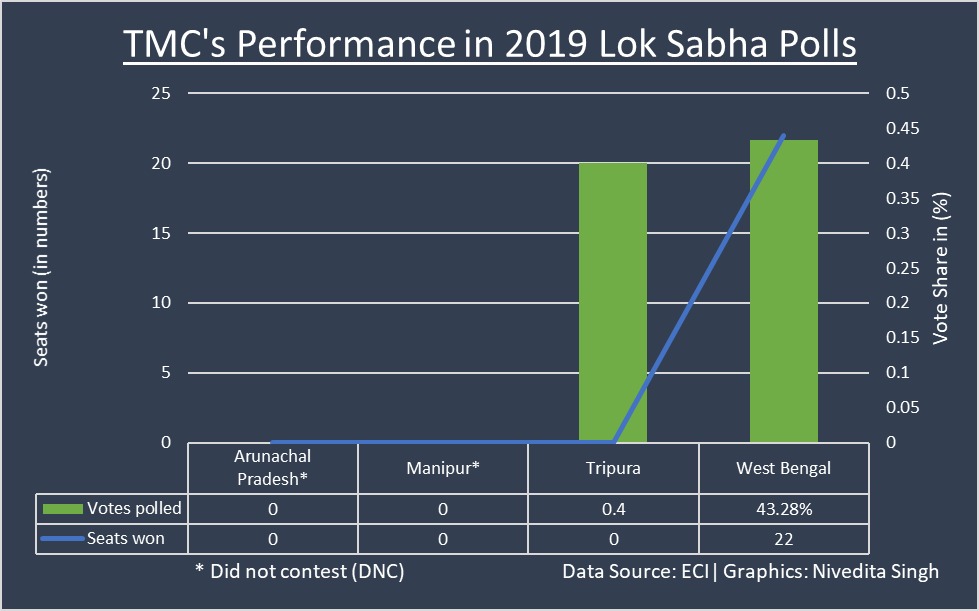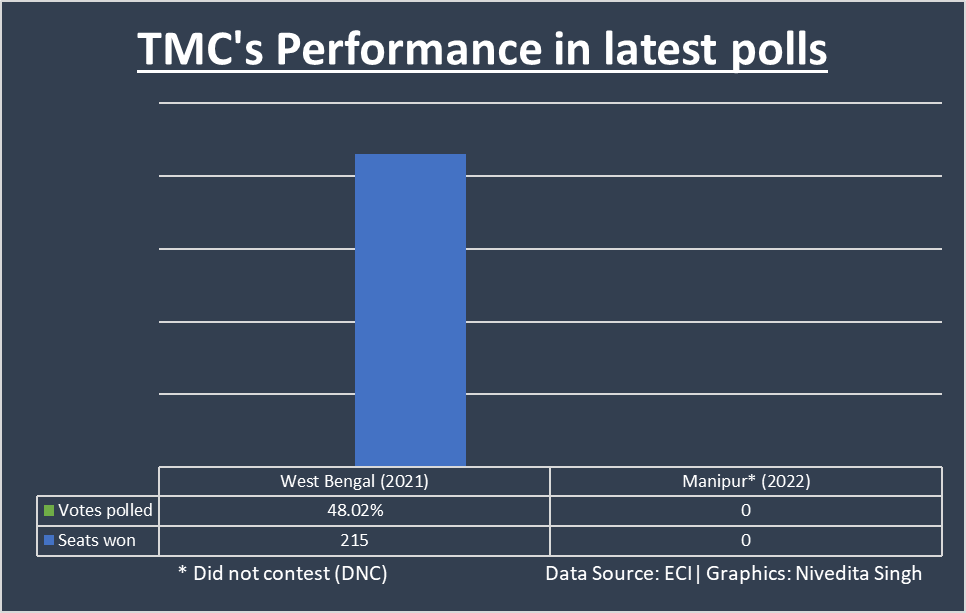broke ties with the Congress, Mamata Banerjee Formed his own political party on January 1, 1998 and named it All India Trinamool Congress – TMC. After more than 16 years, TMC became a national party, but after seven years, the tag was withdrawn.
The Trinamool Congress was exploring legal options to challenge the decision of the Election Commission (EC), which on Monday took back its national party status. However, EC data analyzed by News18 shows that TMC may not survive legally.
First, let us see how the party managed to achieve national status. The simplest eligibility is to be a state party in more than four states.
TMC was declared a state party in West Bengal, Manipur and Arunachal Pradesh in 2014. Later, it also became a state party in Tripura. This was based on its performance in the 2011 assembly elections in West Bengal, the 2012 elections in Manipur and the 2009 assembly elections in Arunachal Pradesh. In the 2014 Lok Sabha elections, its performance in Tripura qualified it to become a state party, and since it was a state party in four states, it was declared a national party in 2016.
In August 2016, amendments were introduced in Para 6C of the Symbols Order Act, 1968, which states that a party’s performance in two consecutive Lok Sabha or Assembly elections is considered for recognition as a national party. . The effective date of this amendment was January 1, 2014.
Despite the party’s poor performance in Arunachal Pradesh in the 2014 Lok Sabha and Assembly elections, it remains a state party there as per the amendments.
In addition to being recognized as a state party in four states, political parties can also become national parties if they get four seats in the last Lok Sabha elections as well as six percent of the votes in any of the four states in the last assembly elections; Or get two percent of all Lok Sabha seats in the last general election with MPs elected from at least three states.
Poor performance outside Bengal
In the 2014 Lok Sabha elections, TMC secured nearly 40 per cent vote share in West Bengal and won 34 out of 42 seats.
However, it fared poorly outside the state. In Manipur (4%), Tripura (10%) and Arunachal Pradesh (2%), the party won no seats, although it did get a share of the total votes.
In the 2019 Lok Sabha elections, TMC did not contest in Arunachal Pradesh and Manipur. In Tripura (0.40%), it failed to win even a single seat. In West Bengal alone, the party got around 45 per cent vote share and 22 seats.
Similarly, in the assembly elections held after 2016, it was only West Bengal where TMC could save face. It did not contest the 2019 assembly elections in Arunachal Pradesh. In the 2018 Tripura elections, the party got 0.30 per cent votes and no seats. In the 2017 Manipur elections, it managed to get just one seat and 1.41 per cent vote share. In the 2016 West Bengal elections, Banerjee’s party got around 45 per cent vote share and 211 seats. In the Manipur elections of 2022, TMC stayed away from the contest.
TMC fails to become state party in Arunachal, Manipur
The TMC did not meet the criteria to be a state party in Arunachal Pradesh based on its performance in the 2014 Lok Sabha and assembly elections held in the same year. In 2019, TMC did not contest these elections in Arunachal Pradesh.
In Manipur too, the TMC failed to meet the criteria in the 2014 and 2019 Lok Sabha elections and the 2017 and 2022 assembly elections. Keeping these results and election performance in mind, the Election Commission decided to withdraw the state party tag of TMC in these states.
What does EC have to say?
Speaking to News18, an Election Commission official said that the status of political parties – state and national – is reviewed after every election.
“The election performance of every recognized political party shall be reviewed by the Election Commission after every general election to the House of the People or the State Legislative Assembly, as the case may be, under the provisions of Articles 6A, 6B and 6C of the Symbols Order ,” said the official, seeking anonymity.
The official said the TMC was issued a show-cause notice in 2019 and asked to submit its comments as to why its national party status should not be withdrawn.
TMC, in its reply, said that it was recognized as a national party in 2016 and is entitled to continue to be recognized as a national party till the 2024 Lok Sabha elections.
“The party has requested to provide time till 2024 to improve its performance in the upcoming general elections,” the Election Commission said. The commission restarted the process in December 2021.
In March 2023, the party said that the satisfaction criteria by the TMC could be reviewed only after the next Lok Sabha elections in 2024.
After considering both the oral and written submissions made by the TMC and a review of the relevant data and election performance of the party, the Commission finds that TMC can be recognized as a state party for two national parties in these states . Or that the state election cycle, after 2016, is “flawed”.
“The TMC reaped the first benefits of the amended rules in 2016 as it got an extension of recognition as a state party in Arunachal Pradesh despite a below-par performance in the 2014 parliamentary elections,” the official said.
Further, “the assessment begins with the position of the parties as on January 1, 2014. Thereafter, there is a ‘next election’, notified for the General Election to the Lok Sabha on March 14, 2014, along with The Legislative Assembly of Arunachal Pradesh held simultaneously”, he said.
In Manipur, the official said, the party did not qualify for the status of a recognized state party on the basis of its performance in the Lok Sabha elections held in 2014 and 2019 and the Assembly elections in 2017 and 2022.
Asked whether the TMC could challenge the EC’s decision, the official said the party had sought an extended opportunity to meet the criteria and win at least 21 assemblies in India between July 2019 and December 2022. Elections were held.
“Records show that TMC participated in six out of these 21 general elections to the Legislative Assemblies. Thus, the extended timeline of the review, triggered by Covid-19, has effectively provided TMC ample opportunities to reclaim its disputed status as a state party and consequently as a national party. In any case, as the election cycle progresses, nothing stops the AITC from regaining the mandatory status under para 6A and 6B,” the official said.
read all latest politics news Here



